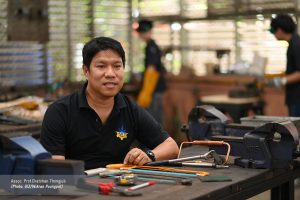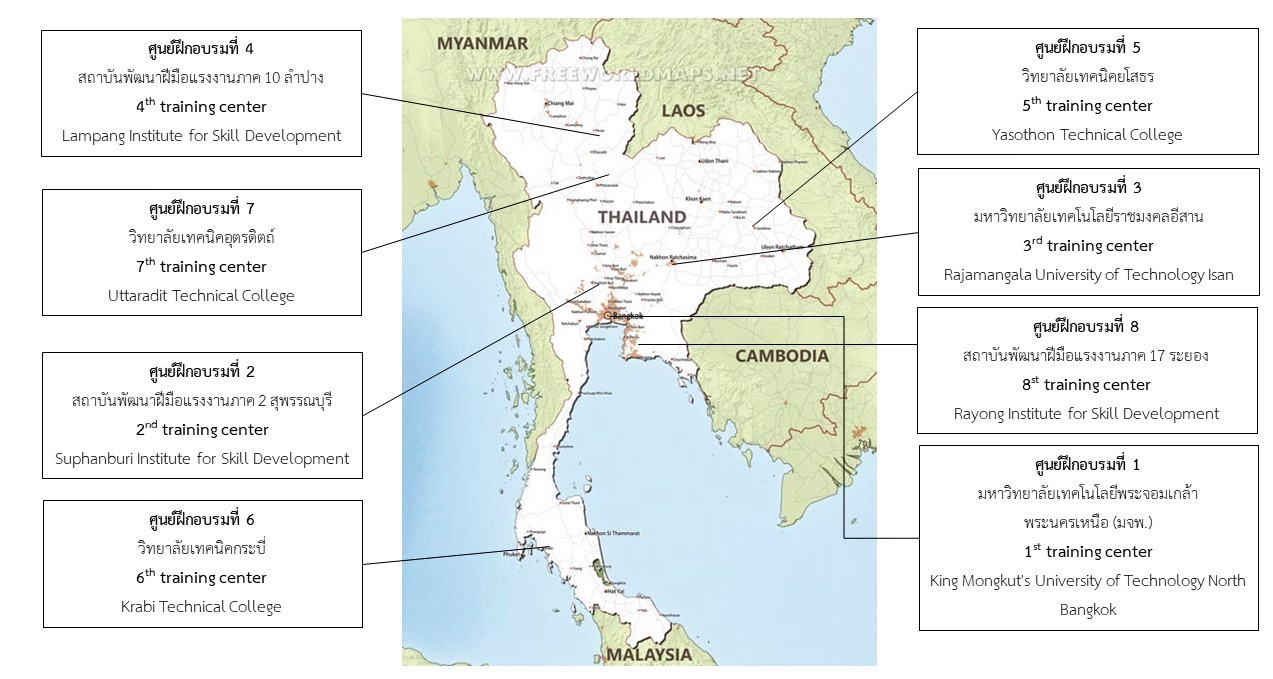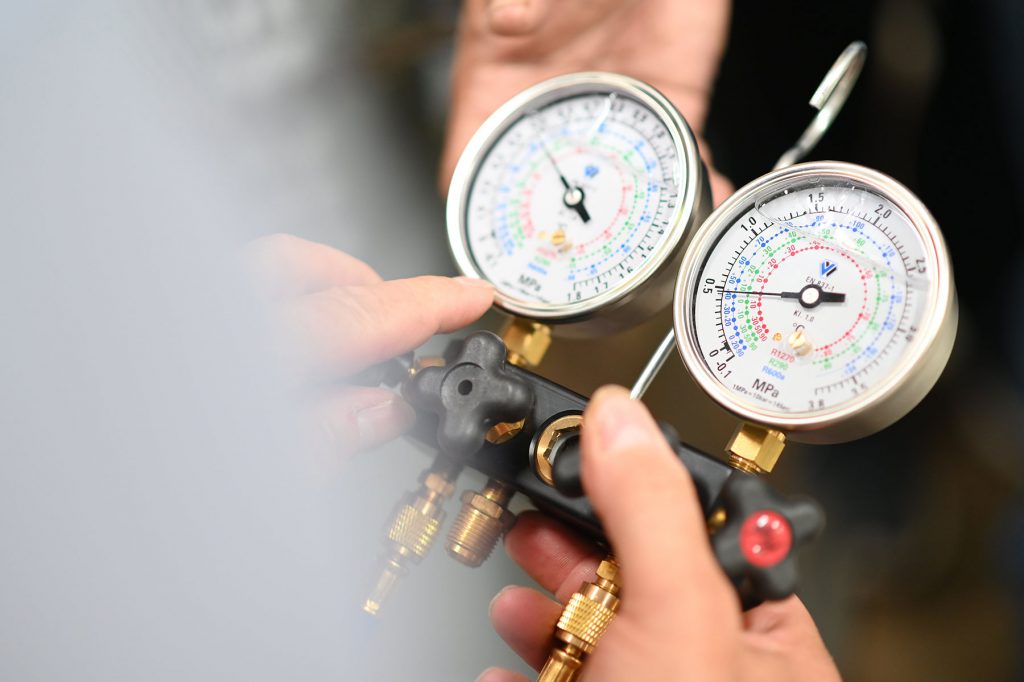In Thailand, where knowledge on flammable natural refrigerants is scarce, efforts are now underway to prepare technicians, vocational teachers and chief trainers from skill development institutes to safely handle cooling agents.
 Eight training courses have been organised this year and five more are planned for 2020. Over the past one year, Assoc. Prof. Chatchan Thongjub of King Mongkut’s University of Technology North Bangkok (KMUTNB) has led the country’s first-ever training in the “Safe Use and Handling of Flammable Refrigerants”. His main task is to make sure that trainees know how to use the flammable refrigerants safely.
Eight training courses have been organised this year and five more are planned for 2020. Over the past one year, Assoc. Prof. Chatchan Thongjub of King Mongkut’s University of Technology North Bangkok (KMUTNB) has led the country’s first-ever training in the “Safe Use and Handling of Flammable Refrigerants”. His main task is to make sure that trainees know how to use the flammable refrigerants safely.
“The switchover from one refrigerant to another is nothing new in the refrigeration and air-conditioning (RAC) sector. And we need to keep up with the requirements that such new technologies entail. As a teacher, it is my duty to pass on the skills and knowledge obtained from international experts to as many Thai technicians as possible,” says Prof. Chatchan, who has been teaching refrigeration and air-conditioning engineering courses at KMUTNB for over 28 years.
Prof. Chatchan knows all too well that many Thai RAC technicians have not received any formal training and thought they could learn it on the job. “This is very risky because sometimes you cannot afford trial and error. With the new refrigerants that we will all be required to use in the future, we have to see what the changes are. It is important that we make sure that our service technicians are trained in the latest technologies. This sector never stops evolving,” he added.
For a long time Thailand has relied on synthetic refrigerants (such as fluorinated refrigerants or F-gases) and is only now discovering the enormous potential in natural-refrigerant technologies. As more manufacturers of RAC equipment switch their production lines to natural refrigerants, Thailand needs to prepare its service workforce to better understand how to use it safely.
Training that is in line with the market
Using R290 for air-conditioners and coolers is recommended throughout this training as it has less global warming potential (GWP) which, as this implies, helps reduce global warming. It also consumes 5-25% less energy and has an excellent heat transfer property, leading to the development of high-quality air-conditioners that are energy efficient and thus help save on electricity bills.

In order to train enough RAC technicians, the programme is being handled in collaboration with 5 key organisations: KMUTNB, the Office of Vocational Education Commission (OVEC), the Department of Skill Development (DSD), the Electricity Generating Authority of Thailand (EGAT) and GIZ. Altogether, 8 training centers have been selected to provide training on natural refrigerants in the north, the north-east, the west, the east, the south, and the central area. The curriculum is under the supervision of KMUTNB.
The “First R Training: Safe Use and Handling of Flammable Refrigerants” took place on 19 August 2019 at KMUTNB, with 12 more training courses taking place nationwide. In addition to general knowledge on various types of refrigerants, the course focused on hands-on exercises such as brazing, copper tubing, evacuation, charging and other precautions when dealing with flammable refrigerants.
A new generation of technicians
Comfortable class sizes with a combination of theoretical input and practical exercise make for a good learning environment. Feedback has shown that the training was an eye-opener, as one instructor from Lampang Regional Institute for Skill Development, Ms. Ratchawan Thongnuam, explained: “This training benefits everyone a great deal. Everyone should learn about the new refrigerant. R290, though flammable, is safe to use if you know how to handle it properly. It is like any other refrigerants. All you need to know is how to handle them.”
For Prof. Chatchan, his only hope is that the trainees will pass on the knowledge to co-workers: “I hope they inform their peers the right way to do things and that they put what they learn into practice.”
When asked what the job prospects are like for the RAC technicians, he replied: “In a tropical country like Thailand, there will always be a demand for AC technicians all year round.”
The training programme is part of Thailand Refrigeration and Air-Conditioning Nationally Appropriate Mitigation Action (RAC NAMA) Project. For the past 3 years, the project has been promoting the use of natural refrigerants in domestic and commercial refrigerators, ACs and chillers.
By the year 2020, about 200 trainers are expected to be trained. They will then assume the role of knowledge carriers in training their peers or technicians in their respective networks to understand more about green cooling.

 Eight training courses have been organised this year and five more are planned for 2020. Over the past one year, Assoc. Prof. Chatchan Thongjub of King Mongkut’s University of Technology North Bangkok (KMUTNB) has led the country’s first-ever training in the “Safe Use and Handling of Flammable Refrigerants”. His main task is to make sure that trainees know how to use the flammable refrigerants safely.
Eight training courses have been organised this year and five more are planned for 2020. Over the past one year, Assoc. Prof. Chatchan Thongjub of King Mongkut’s University of Technology North Bangkok (KMUTNB) has led the country’s first-ever training in the “Safe Use and Handling of Flammable Refrigerants”. His main task is to make sure that trainees know how to use the flammable refrigerants safely.